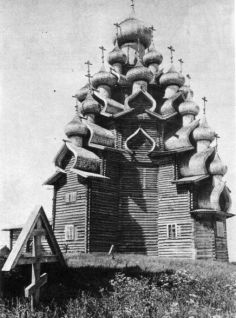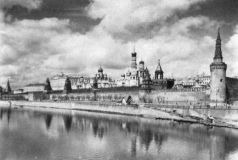and stupid rule by individual Ger-

Head of St. Peter of Alexandria, from the fresco in the Church of the Savior on the Nereditsa, Novgorod, 1197.

Holy Gates of the Rizpolozhenskii Monastery in Suzdal, seventeenth century.
Preobrazhenskaia Church, 1714, in Kizhy near Petrozavodsk. It has 22 cupolas.


Sixteenth-century view of the city of Moscow.
Red Square in Moscow, 1844.

Church of St. Basil the Blessed, Moscow, 1555-60.


Zagorsk, with Holy Trinity-St. Sergius Monastery, Kremlin, and Assumption Cathedral. Fifteenth and sixteenth centuries and later.
Moscow Kremlin


Soviet architecture: Moscow State University, on Lenin Hills.
Hermitage Museum, Leningrad, 1852.

The seventeenth-century Simeon Stolpnik Church on Moscow's Novgi Arbat in front of a Soviet housing project.

mans and even 'the German party' in Russia. And while this interpretation should not be overdone - for, after all, the 1730's, in foreign policy, in social legislation, and in other major respects constituted an integral part of the Russian evolution in the eighteenth century rather than anything specifically German - it remains true that Anne brought with her from Courland a band of favorites, and that in general she patronized Germans as well as other foreigners and distrusted the Russian nobility. The sovereign herself proved largely unfit and thoroughly disinclined to manage state affairs. Certain departments, such as the foreign office with Ostermann at the head and the army with Munnich, profited from able German leadership of the Petrine vintage; but many new favorites had no qualifications for their positions, acted simply in their personal interest, and buttressed their remarkable ignorance of Russia with their disdain of everything Russian. Ernst-Johann Biren, or Siron, the empress's lover from Courland, acquired the highest honors and emoluments and became the most hated figure and symbol of the reign.
Anne died in the autumn of 1740. Shortly before her death she had nominated a two-month-old infant, Ivan, to be her successor on the throne. Ivan was a great-grandson of Ivan V and a grandson of Anne's elder sister, Catherine, who in 1716 had married the Duke of Mecklenburg, Charles Leopold. A daughter from this marriage, Anna Leopoldovna, became the wife of Duke Anthony Ulric of Brunswick-Bevern-Liineburg. The new emperor was the child of Anna Leopoldovna and Anthony Ulric. But, although both of his parents resided at the Russian court, Empress Anne appointed Biren as regent. The arrangement failed to last. First, within a month Biren was overthrown by Munnich and Anna Leopoldovna became regent. Then, in another year, late in 1741, Ivan VI, Anna Leopoldovna, and the entire 'German party' were tumbled from authority and power. This last coup was executed by the guards led by Peter the Great's daughter Elizabeth, who then ascended the throne as Empress Elizabeth of Russia.
Just as Anne and her reign have been excessively blamed in Russian historiography, Elizabeth has received more than her fair share of praise. Kind, young, handsome, and charming, the new monarch symbolized to many contemporaries and later commentators the end of a scandalous 'foreign' domination in Russia and even, to an extent, a return to the glorious days of Peter the Great, an association which the empress herself stressed as much as she could. But in truth there was little resemblance between the indolent, easy-going, and disorganized, although by no means stupid, daughter and the fantastically energetic, active, and forceful father. Although the cabinet was abolished, the Senate was restored to its former importance, and certain other administrative changes were made that also harked back to the reign of Peter the Great, the spirit and vigor of the celebrated reformer could not be recaptured, nor in fact was a serious attempt made to recapture them. Moreover, the social and economic evolution of the country continued under Elizabeth as under Anne: neither ruler made a strong personal impress on it. Even Elizabeth's abolition of capital punishment, enlightened and commendable in itself as well as strikingly different from the practices of Anne's government, pales into insignificance when compared to the enormous, persistent, and in fact growing evil of serfdom.
Favorites continued to occupy the stage, although their identity changed, and the new group proved on the whole more attractive than the one sponsored by Empress Anne. Alexis Razumovsky, who may have been morganatically married to Elizabeth, was closest to the monarch. His rise to eminence represents an earlier and truer version of Andersen's tale of the princess and the swineherd. He was a simple cossack in origin, who tended the village flock in his native Ukraine. Because of his magnificent voice, the future favorite was brought to the court as a singer. Elizabeth fell in love with him, and her attachment lasted until her death. Yet, while Alexis Razumovsky became a very close associate and perhaps even the husband of the empress, his impact on state affairs remains difficult to discern. Indeed one historian, in a rather typical evaluation, dismisses the favorite as follows:
He became the bearer of all Russian decorations, a General Field Marshal, and he was raised to the position of Count of the Holy Roman Empire. He was very imperious, even lived in the palace. But he was distinguished by an honest, noble, and lazy character. He had little influence on the governing of the country: he constantly dodged state affairs. He did much good in Ukraine and in Russia, and in his tastes and habits he remained more a simple Ukrainian than a Russian lord. In the history
of the Russian court he was a remarkable individual, in the history of the state - an entirely insignificant actor.
Alexis Razumovsky's younger brother, Cyril, received a good education abroad and occupied such important offices as those of President of the Academy of Sciences, Field Marshal, and Hetman of Ukraine.
The Shuvalovs, the brothers Peter and Alexander and their cousin Ivan, displayed more energy than the Razumovskys. Ivan Shuvalov, the empress's favorite, left behind him an almost unique reputation for integrity and kindness, for refusing honors and rewards, and for selfless service in several capacities, especially in promoting

